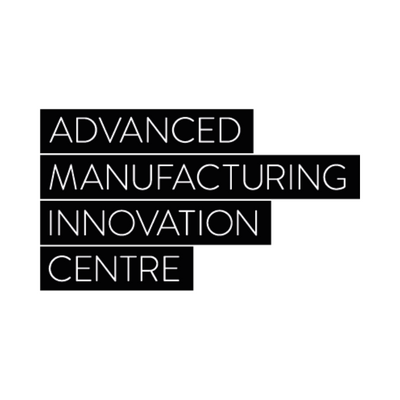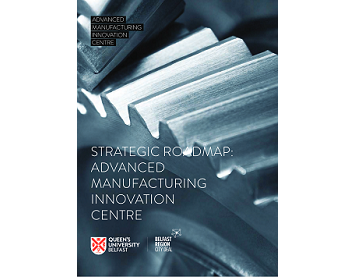Case study
Ecosystem roadmapping delivers a technology strategy to support manufacturing in Northern Ireland
ADVANCED MANUFACTURING INNOVATION CENTRE (AMIC)
Impact
Six key themes were identified as priorities for AMIC, assessed as offering very substantial and persistent medium- to long-term improvement in Northern Ireland’s global advanced manufacturing competitiveness

Outcomes confirmed AMIC’s top-level strategy and gained a clear alignment on its priorities to take forward
Impact
Six key themes were identified as priorities for AMIC, assessed as offering very substantial and persistent medium- to long-term improvement in Northern Ireland’s global advanced manufacturing competitiveness

Outcomes confirmed AMIC’s top-level strategy and gained a clear alignment on its priorities to take forward
The challenge
With £98m of investment, the Advanced Manufacturing Innovation Centre (AMIC) is being set up to operate at the interface between academia and industry, by creating new opportunities for innovative manufacturing.
AMIC is one of three innovation projects being delivered by Queen’s University Belfast in partnership with government and industry under the Belfast Region City Deal. Manufacturing in Northern Ireland (NI) is more important to the regional economy as a percentage compared to the rest of the UK and is dominated by SME businesses.
IfM Engage was approached by senior leads at AMIC to help them consult with industry to develop a strategy that:
- Is forward looking and met the needs of industry
- Involves consultation with the industrial base from SMEs to world-leading multinational organisations
- Helps smaller organisations build on their domestic strengths whilst realising the opportunities available internationally
- Ensures that the range of innovation investment and support is delivered effectively at both central and local levels
- Aligns with local and global industry trends and drivers and supports the key opportunities for future product and service developments.
The main objectives of the project were to:
- Help frame the strategic agenda for technology in the AMIC
- Provide input into the skills development agenda
- Understand the key thematic areas on which to focus funding and support
The solution
After working with AMIC to establish a thorough understanding of their needs, an industry-engaging innovation process was developed. A combination of ecosystem mapping and strategic roadmapping were identified as the best approaches to meet the project objectives. The project was delivered in the following stages:
- Pre-work stakeholder interviews
Early in the project, IfM Engage conducted interviews with approximately 15 key stakeholders representing both industry and government. During the interviews, insights were gained into the main drivers of change, the competitive position of local industries, future capabilities needed and what support is expected from AMIC to help those needs. The responses provided a first look at the priorities, and these were subsequently brought into a series of workshops for further development.
- Pre-work – development of straw man ecosystem mapping and industry landscape
“Straw man” ecosystem mapping and information landscapes of the industrial scene were developed using sector reports and structured pre-work from contributors across industry and government as input to the subsequent workshops.
The ecosystem map identified at the sectoral level the value prime and supply chain members of the local and national innovation ecosystem bring and key potential business risks.
The landscape identified a first-pass view over the timescale of the strategy of the key trends and drivers, associated products, services and solutions and required capabilities and enablers that would support those solutions.

- Roadmapping and ecosystem mapping workshops
The two-day roadmapping workshops involved representatives of approximately 60 companies and organisations including managers and senior leads from manufacturing, services providers, consulancies, and government agencies.
Two workshops, each with the same process and structure involved stareholders from industries including aerospace, automotive, mechanical handling, electrical, healthcare, process and food and drink; as well as automation providers, consultancies and other relevant services.
Delegates were grouped into like-minded sectors and they were provided with the initial landscape which was identified during the interviews and pre-work. The groups worked on the landscapes from the perspectives of their sector and they added to, subtracted from and reprioritised what was most important to them.
At the end of the workshops on day one, responses were collated to identify high-priority themes emerging from the groups. The findings were recut into six strategic themes and a first-pass view of between two and four topics per theme for which small working groups would develop roadmaps.
On day two, the groups focused first on the ecosystem surrounding their key theme. By working on the straw man ecosystem developed through the interviews and pre-work, they looked at who the key players are who need to be involved to make innovation work and what they could contribute. The groups also looked at what observations they could make about how well the market is generally understood and how competitive they are within the theme. This discussion prompted a finalisation of the topics for which roadmaps were then developed. Each roadmap was then reviewed by all delegates who added their assessment of the scale of opportunity and the feasibility of delivery.
An IfM Engage report was generated based on the output from the workshops which was shared with all of the key stakeholders, including workshop attendees and pre-work contributors for their feedback.
The results
Key theme recommendations for AMIC
- Six key themes were identified as priorities for AMIC, assessed as offering very substantial and persistent medium- to long-term improvement in Northern Ireland’s global advanced manufacturing competitiveness
- Four themes were assessed as able to be readily adopted by the supply chain or adopted with concerted efforts by government and industry, as the capability already exists
- Two themes were assessed as more challenging, as delegates were uncertain whether concerted investment by government and industry will realise that capability. Subsequent discussions indicated that these themes offer an opportunity for NI to take a lead in developing capability in concert with the wider UK
The benefits of roadmapping and ecosystem mapping
- The outcomes have confirmed AMIC’s top-level strategy and gained a clear alignment on its priorities to take forward
- A good platform has been established for the promotion of the AMIC, what it’s about and the way it works has been established. The workshops have helped strengthen relationships between industry and AMIC
- An understanding has been gained of how to manage the wider innovation ecosystem and the role of local innovation centres vs larger centres, such as building the capability of smaller companies
- A roadmapping and ecosystem mapping-based innovation process has enhanced engagement and collaboration amongst a diverse group of stakeholders:
- Ecosystem mapping spurred helpful conversations about the role of AMIC as part of the industry network and what they need to do for example in addition to building specific technology applications, knowledge enhancement and bringing outside-world expertise to NI
- Roadmapping brought a structured model and common language for efficient collaboration across a diverse group of stakeholders

“Engaging with IfM was welcomed by all stakeholders across industry, government, and academia to deliver the AMIC Strategic Technology Roadmap 2022. IfM’s experience, together with an impartial and balanced approach, was vital to the success of this exercise. With a strong focus on industry engagement in workshops and one to one interviews with strategic stakeholders, they have delivered a Strategic Technology Roadmap to AMIC, informed by industry driving industry needs. The report has established a blueprint which will guide AMIC’s future strategy and investment while also informing current and future academic research and helping guide essential government support. We look forward to continued engagement with IFM as we evolve and update the Strategic Technology Roadmap.”
Colm Higgins, Head of Northern Ireland Technology Centre, Chair of the AMIC Strategic Technology Road Mapping Working Group

“Engaging with IFM was welcomed by all stakeholders across industry, government, and academia to deliver the AMIC Strategic Technology Roadmap 2022. IfM’s experience, together with an impartial and balanced approach, was vital to the success of this exercise. With a strong focus on industry engagement in workshops and one to one interviews with strategic stakeholders, they have delivered a Strategic Technology Roadmap to AMIC, informed by industry driving industry needs. The report has established a blueprint which will guide AMIC’s future strategy and investment while also informing current and future academic research and helping guide essential government support. We look forward to continued engagement with IFM as we evolve and update the Strategic Technology Roadmap.”
Colm Higgins,
Head of Northern Ireland Technology Centre, Chair of the AMIC Strategic Technology Road Mapping Working Group

“AMIC is entering an exciting new phase in its development, starting the transition from project into a centre, with the mobilisation of existing assets and capabilities and the definifion of new launch projects and our new strategy for investment and technology development. In this regard, the AMIC Strategic Technology Roadmap 2022 will be invaluable in assisting the leadership team of AMIC, significantly enhanced by the arrival of Sam Turner as our new CEO, and our Industrial Board with the development of our future capabilities. The work of IfM has been of high standard and we are thankful to Andrew Gill and Rob Munro for delivering such a comprehensive documentation of Northern Ireland’s manufacturing requirements. A lot of people worked very hard to deliver this roadmap and I would like to thank all members of the AMIC Office, acknowledge the contribution of all members of the roadmapping steering group and especially thank Colm Higgins for his vision and personal drive to develop this roadmap. Finally, I would like to stress that this roadmap belongs to our manufacturing industry and we will be renewing it at certain intervals to remain updated and relevant.”
Professor Paul Maropoulos,
AMIC Director

“AMIC is entering an exciting new phase in its development, starting the transition from project into a centre, with the mobilisation of existing assets and capabilities and the definifion of new launch projects and our new strategy for investment and technology development. In this regard, the AMIC Strategic Technology Roadmap 2022 will be invaluable in assisting the leadership team of AMIC, significantly enhanced by the arrival of Sam Turner as our new CEO, and our Industrial Board with the development of our future capabilities. The work of IfM has been of high standard and we are thankful to Andrew Gill and Rob Munro for delivering such a comprehensive documentation of Northern Ireland’s manufacturing requirements. A lot of people worked very hard to deliver this roadmap and I would like to thank all members of the AMIC Office, acknowledge the contribution of all members of the roadmapping steering group and especially thank Colm Higgins for his vision and personal drive to develop this roadmap. Finally, I would like to stress that this roadmap belongs to our manufacturing industry and we will be renewing it at certain intervals to remain updated and relevant.”
Professor Paul Maropoulos,
AMIC Director
About the Advanced Manufacturing Innovation Centre
The Advanced Manufacturing Innovation Centre operates at the interface between academia and industry by creating new opportunities for innovative manufacturing in the Belfast City Region. A state-of-the-art Factory of the Future is planned as the flagship facility of the project, with an ambition to be Northern Ireland’s national centre for Advanced Manufacturing. AMIC caters to the Manufacturing Sector in NI by supporting small to medium-sized enterprises.

